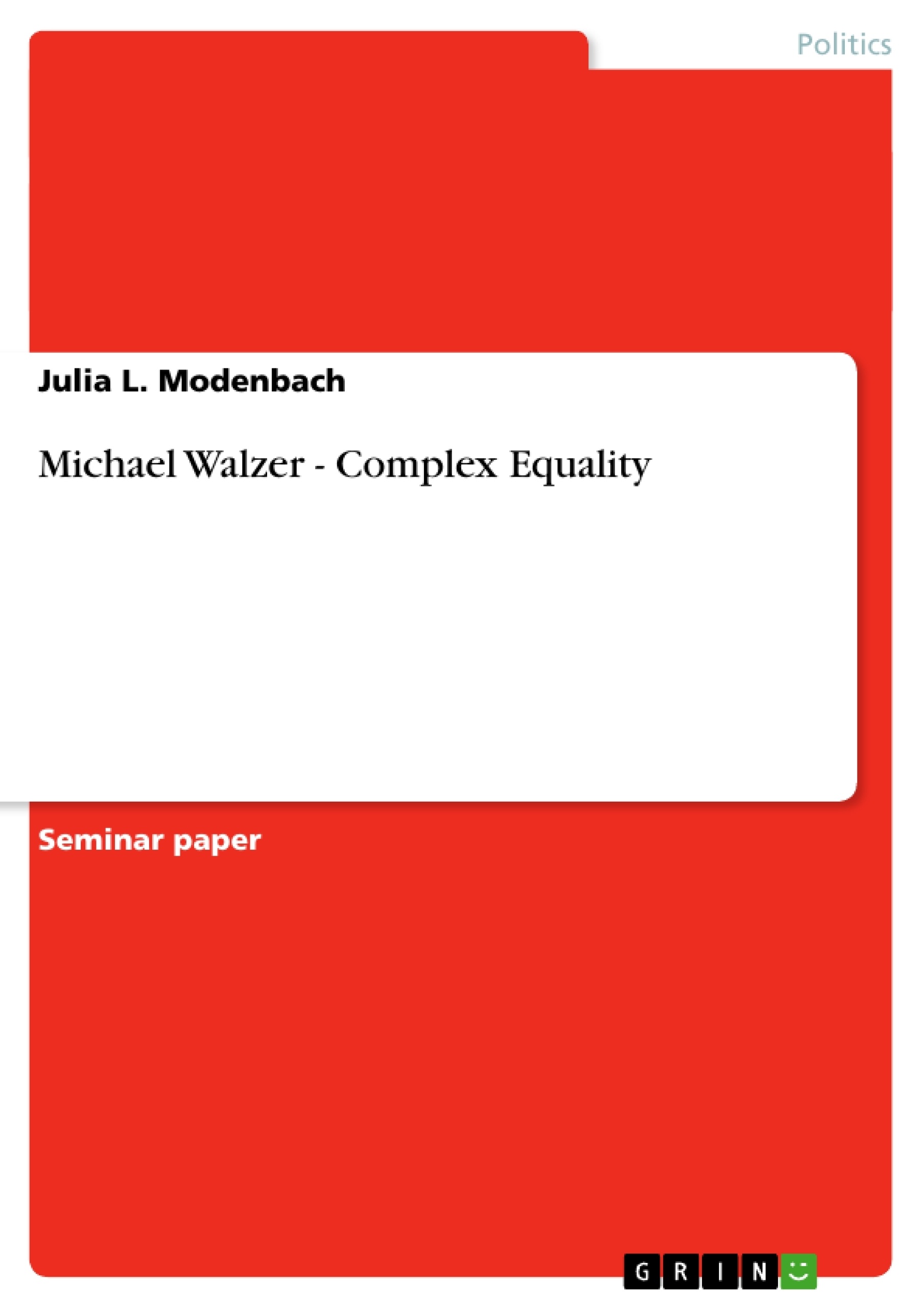Leseprobe
Table Of Content's
1. Preface
2. Pluralism
2.1. A Theory of Goods
3. Monopoly and Dominance
4. Simple vs. Complex Equality
4.1. The idea of simple equality
4.2. Walzers concept of complex equality
5. Three distributive principles
5.1. Free Exchange
5.2. Desert
5.3. Need
6. Personal Statement
1. Preface
To begin this essay about the theory of the spheres of justice developed by Michael Walzer, I would like to quote the author with a phrase from the Preface of his book “Spheres of Justice”:
“But we know that money equally distributed at twelve noon of a Sunday will be unequally redistributed before the week is out.” (Walzer, 1983: xi)
Michael Walzer is a philosopher who wrote his most famous book (from which I just quoted) about distributive justice and equality, he points himself against the egalitarianist philosophic direction that for example John Rawls is representing.
Walzer critizes egalitarianism by beginning at a crucial point: Human beings are not equal, they have far less in common than there are differences between them.
For him, one question arises out of the following statement: “We are very different and we are also manifestly alike. Now, what (complex) arrangements follow from the difference and the likeliness?” (Walzer, 1983: xii)
The big difference in egalitarian and his thinking, Walzer describes as follows: For him, egalitarianism aims at eliminating dominance by forcing human beings to be equal But Walzer thinks that domination does not derive from dominant human beings but that it is mediated by a set of social goods.
His claim is then: “We have to understand and control social goods; we do not have to stretch or shrink human beings.” (Walzer, 1983: xiii)
2. Pluralism
The first basic assumption of Walzer is that human society is based on the principle of distributive justice. Walzer doubts the general philosphic idea, that there is only one just distributive system and this would be the system that all rational men and women would agree to. This idea, we find in a very strong form in Rawls´ theory of justice, especially in the concept of the natural state and the veil of ignorance.
According to Walzer, there is not one distributive system that can be applied for a society but there is and has to be a plualistic set of distributive principles.
“The principles of justice are themselves pluralistic in form; that different social goods ought to be distributed for different reasons, in accordance with different procedures, by different agents; and that all these differences derive from different understandings of the social goods themselves – the inevitable product of historical and cultural particularism.” (Walzer, 1983: 6)
2.1. A Theory of Goods
Distributive justice then resides on the assumption that social systems are build according to the maxime:
“People distribute goods to (other) people.” (Walzer, 1983: 6).
Walzer transforms this maxim into the following:
“People conceive and create goods which they then distribute among themselves.” (Walzer, 1983: 6)
Walzer takes into account that goods are not only distributed but they are conceived and created. Therefore, he argues, goods have a social meaning. Goods are then not only distributed to whatever rules but they are distributed according to and because of their social meaning. Walzer then develops six theses that outline a pluralistic distribution system according to the theory of goods.
The first thesis is that any given good that has to be considered by distributive justice is a social good. This means the meanings of the social goods derive from their creation and conception. Because of these two social processes the goods become their social meanings. Therefore, the same good can have many different meanings in different societies. To illustrate this, he refers to a famous quotation by John Stuart Mill who said that “people like in crowds” (see: Walzer, 1983: 7), this is applied to the social meanings of the goods. Walzer wants to say with this that the like or dislike of a social good can only happen in crowds because social meanigs manifest themselves only in social processes, a single person could not value a good because it lacks the social context.
In the second thesis, Walzer describes the consequences of the constant trading of goods on the people trading. He says that the identities of human beings are shaped by their trading and distributing of goods. He calls this the “history of transactions” (Walzer, 1983: 7) that every human being has. This history shapes the human beings´ understanding of the meanings of social goods and of the future transactions he is going to make.
The third thesis rejects that there are universal social goods, valued everywhere in the same way. Walzer assumes that one cannot conceive one set of basic goods that are valued across all cultural and moral spheres. His reason for that is developed already in the first and second thesis: All kinds of goods have a social meaning that is attributed to them as a result of social processes, especially of the processes of conception and creation.
[...]
- Arbeit zitieren
- Julia L. Modenbach (Autor:in), 2003, Michael Walzer - Complex Equality, München, GRIN Verlag, https://www.grin.com/document/18886
Kostenlos Autor werden






















Kommentare